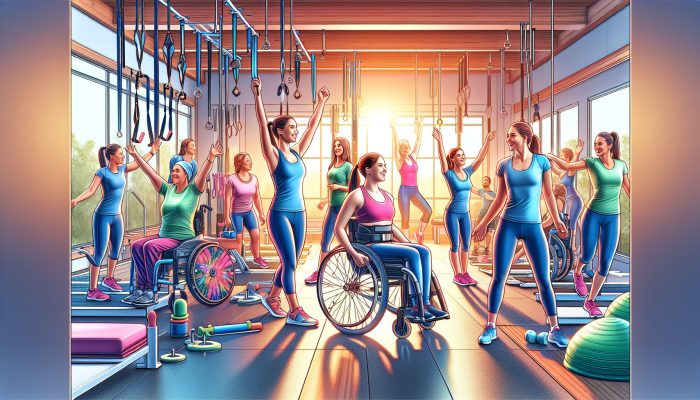Empower Women with Disabilities by Implementing Comprehensive Wellness Strategies
What Constitutes Holistic Wellness for Women with Disabilities?

Wellness extends far beyond the mere absence of illness; it embodies a holistic state of complete physical, mental, and social well-being. This broad definition accounts for various health dimensions, aspiring to create a harmonious equilibrium between the body and mind. Attaining genuine wellness involves nurturing a lifestyle that enhances vitality and resilience, empowering individuals to thrive daily and confront challenges with confidence.
For women with disabilities, the journey toward wellness can be particularly intricate due to a multitude of obstacles. The unique needs and lived experiences of these women necessitate a customized strategy that addresses their specific circumstances. By interpreting wellness as a complex and multifaceted concept, we can adopt a more inclusive perspective that resonates across different communities, especially among those with disabilities.
What Unique Challenges Do Women with Disabilities Encounter in Their Wellness Journey?
Women with disabilities face a myriad of challenges that can impede their pursuit of wellness. These hurdles often arise from inaccessible environments, prevailing societal attitudes, and systemic barriers that often marginalize their experiences. For example, the lack of wheelchair accessibility in public spaces frequently discourages participation in community activities, which can lead to heightened feelings of isolation.
Furthermore, societal perceptions surrounding disability can intensify feelings of inadequacy and self-doubt, adversely impacting mental health. It is vital to comprehend the intricate interplay of these factors, as they underscore the urgent need for supportive frameworks that address both physical and mental wellness. The better we understand these challenges, the more effectively we can advocate for significant and lasting change.
Why Is It Crucial to Develop Customized Wellness Programs for Women with Disabilities?
Establishing customized wellness programs is essential for enhancing the quality of life for women with disabilities. These programs must be inclusive and recognize the diverse experiences and needs within this demographic. By emphasizing personalized strategies, we can effectively address the unique barriers these women encounter, leading to improved accessibility and greater engagement in health-related practices.
Wellness initiatives that consider the specific circumstances of women with disabilities can bolster participation in physical activities, improve mental health outcomes, and strengthen social connections. The importance of such programs cannot be overstated, as they foster a sense of belonging and community—two fundamental components of holistic well-being.
What Proven Strategies Can Effectively Enhance Wellness for Women with Disabilities?

To enhance wellness among women with disabilities, several effective strategies can be implemented. First and foremost, ensuring accessible healthcare is paramount. This involves not only physical access to healthcare facilities but also ensuring that healthcare providers are adequately trained to comprehend the unique challenges faced by these women.
Additionally, nurturing community support can create a robust network for women with disabilities, enabling them to share experiences and resources. The implementation of adaptive fitness programs tailored to individual abilities is also crucial for promoting regular physical activity. By integrating these strategies, we can foster an inclusive environment that significantly improves overall well-being.
Expert Perspectives on Wellness for Women with Disabilities
What Are the Essential Components of Effective Wellness Programs?
Successful wellness programs designed for women with disabilities should incorporate several core elements that prioritize accessibility and adaptability. Key components include:
- Physical Activity: Personalized exercise routines designed to cater to individual abilities.
- Mental Health Support: Access to counseling and psychological services tailored to address specific needs.
- Social Engagement: Opportunities for community involvement and connection with peers.
- Nutritional Guidance: Customized dietary advice that caters to individual health requirements.
- Educational Resources: Workshops and information on various wellness topics.
- Peer Support: Facilitation of connections with others facing similar challenges.
- Access to Technology: Utilization of apps and tools that promote wellness.
Each of these components plays a vital role in cultivating an environment that meets the diverse needs of women with disabilities. By ensuring that wellness programs are inclusive and adaptable, we can advocate for a holistic approach that empowers these women to accomplish their wellness aspirations.
How Can Healthcare Providers Promote Wellness for Women with Disabilities?

Healthcare providers play a pivotal role in advocating for wellness among women with disabilities. They can facilitate wellness in various ways, starting with tailored advice and resources that take into account each individual’s unique circumstances. This personalized approach necessitates understanding the varied needs of patients and offering practical solutions that enhance their health outcomes.
Healthcare providers can implement actionable steps such as conducting regular wellness assessments, referring patients to specialized services, and collaborating with community organizations to establish support networks. Engaging in training programs to raise awareness about the unique challenges faced by women with disabilities is also critical. By fostering a supportive and empathetic healthcare environment, providers can significantly enhance the well-being of these women.
What Successful Wellness Initiatives Serve as Exemplars for Change?
Exploring successful wellness initiatives can provide invaluable insights and inspiration for bettering the lives of women with disabilities. One exemplary program in the UK is the Inclusive Fitness Initiative, which strives to make gyms and fitness centers more accessible and welcoming to individuals with disabilities. This initiative has led to the creation of customized fitness classes that accommodate various abilities, promoting an inclusive community atmosphere.
Another commendable example is the Women’s Health and Fitness Programme, which offers workshops focused on physical activity, nutrition, and mental health specifically for women with disabilities. This program not only promotes physical wellness but also encourages social interaction and mutual support among participants. Such initiatives highlight the significant impact that well-structured wellness programs can have on the lives of women with disabilities, underlining the importance of community-driven solutions.
In What Ways Can Technology Enhance Wellness for Women with Disabilities?
Technology plays an essential role in advancing wellness for women with disabilities. Accessible apps and online platforms deliver invaluable support and resources, allowing women to engage with wellness practices from the comfort of their homes. For instance, fitness applications that offer adaptive exercise routines can cater to a range of disabilities, enabling users to customize their workouts according to their unique abilities and preferences.
Moreover, virtual support groups and telehealth services have gained popularity, providing crucial mental health support without the obstacles associated with travel. These technologies can be tailored to address the specific needs of women with disabilities, fostering a sense of connection and community. By leveraging technology, we can significantly enhance access to wellness resources and promote holistic well-being for women with disabilities.
What Role Does Community Play in Supporting Wellness for Women with Disabilities?
The influence of community involvement on wellness is profound, particularly for women with disabilities. A supportive community can offer social connections, resources, and emotional support, which are all vital for enhancing wellness. Community programs that prioritize inclusivity and accessibility empower women with disabilities to actively participate in their localities, fostering a sense of belonging.
Initiatives such as community fitness classes, social events, and awareness campaigns can dismantle barriers and encourage participation. Across the UK, many organizations work diligently to create inclusive spaces for women with disabilities, enabling them to share their experiences and support one another. This sense of community not only enriches the lives of women with disabilities but also nurtures a culture of understanding and acceptance within society.
Physical Activity and Fitness: A Vital Pathway to Holistic Wellness
What Accessibility Features Are Imperative in Fitness Facilities Across the UK?
Accessible fitness facilities are essential for enabling women with disabilities to engage in regular physical activity. These facilities must be equipped with adaptive equipment and provide inclusive programs that cater to various abilities. Key accessibility features, such as ramps, wide doorways, and specialized equipment, are critical for creating an environment that allows everyone to participate fully.
In the UK, many gyms and fitness centers have made significant progress toward becoming more inclusive. Notable examples of accessible fitness facilities include:
- Sport England’s Inclusive Fitness Initiative centers.
- Local community gyms offering adapted equipment.
- National Health Service (NHS) fitness programs.
- Charity-run facilities designed for inclusivity.
- Online fitness platforms featuring accessible workouts.
- Local councils advocating for accessible sports initiatives.
- Adaptive sports clubs focusing on diverse activities.
These facilities not only promote physical fitness but also foster a sense of community and belonging among participants. By prioritizing accessibility, we empower women with disabilities to lead active lives and enhance their overall health and well-being.
What Types of Exercise Are Most Beneficial for Women with Disabilities?
When determining the most beneficial types of exercise for women with disabilities, it is crucial to recognize that individual preferences and abilities can vary significantly. Various forms of exercise, such as swimming, yoga, and strength training, offer unique advantages tailored to individual needs. Swimming, for instance, is often recommended due to its low-impact nature, providing an excellent cardiovascular workout while being gentle on the joints.
Yoga also serves as an effective option, promoting flexibility, balance, and mental relaxation. Participants can engage in adaptive styles, making it accessible for diverse abilities. Strength training, when appropriately adapted, can enhance muscle tone and strength, contributing to overall physical fitness. The key lies in identifying exercises that are enjoyable and sustainable, fostering a long-term commitment to an active lifestyle.
How Can Women Overcome Barriers to Engaging in Physical Activity?
Barriers to physical activity for women with disabilities can be intricate, encompassing inaccessible facilities, transportation challenges, and negative societal attitudes. Addressing these obstacles is essential for promoting fitness and wellness. One effective strategy involves advocating for improved accessibility in infrastructure, such as public transport equipped with wheelchair access and gym facilities that feature adaptive equipment.
Additionally, raising awareness about the importance of inclusion within fitness communities can help dismantle negative societal perceptions. Creating an environment that welcomes and supports women with disabilities encourages participation and fosters a sense of belonging. Community outreach programs can also facilitate transportation options, ensuring that women can access fitness facilities and activities without undue stress or barriers.
Mental Health and Emotional Well-being: Core Elements of Holistic Wellness
What Common Mental Health Challenges Do Women with Disabilities Face?
Women with disabilities may experience higher rates of depression, anxiety, and other mental health issues due to a combination of societal and personal challenges. The stigma surrounding disability can heighten feelings of isolation and inadequacy, further impacting mental health. Recognizing these common challenges is essential for developing effective support strategies.
Typical mental health challenges may involve feelings of low self-esteem, chronic stress linked to navigating inaccessible environments, and anxiety stemming from societal expectations. Acknowledging these issues allows us to address the underlying factors contributing to mental health struggles. This understanding serves as the foundational step toward creating effective interventions that promote emotional well-being for women with disabilities.
What Strategies Can Effectively Enhance Emotional Well-being?
Improving emotional well-being necessitates a multifaceted approach that incorporates self-care practices, social support, and professional assistance. Self-care might involve activities such as mindfulness, meditation, and engaging in hobbies that ignite joy. Women with disabilities should be encouraged to prioritize their mental health by dedicating time for self-care and relaxation.
Social support significantly contributes to emotional well-being. Connecting with friends, family, or support groups can foster a sense of belonging and validation. Peer support groups specifically designed for women with disabilities can be particularly impactful, providing a safe space to share experiences and challenges while nurturing community solidarity. Additionally, seeking professional help from mental health practitioners who understand the unique needs of women with disabilities can offer valuable strategies for managing mental health challenges.
How Can Women Access Mental Health Services in the UK?
Accessing mental health services can be challenging for women with disabilities, often due to systemic barriers and a lack of awareness regarding available resources. It is critical for these women to be informed about the various mental health services available in the UK, such as NHS mental health services, community support groups, and online therapy options. Familiarity with these resources can empower women to seek help when needed.
Navigating the healthcare system may require assistance, and women with disabilities should feel encouraged to seek help from support networks or advocacy groups. Furthermore, healthcare providers must be trained to identify and address the unique challenges faced by these women, ensuring they receive appropriate referrals and support. By improving access to mental health services, we can make significant strides in enhancing emotional well-being for women with disabilities.
What Role Do Community and Peer Support Play in Enhancing Mental Health?
Community and peer support groups offer invaluable emotional and practical assistance for women with disabilities, significantly enhancing their mental health and emotional well-being. These groups create a platform for sharing experiences, challenges, and strategies, fostering a sense of connection and understanding among participants. Such interactions can alleviate feelings of isolation and empower women to advocate for their wellness needs.
In the UK, numerous organizations facilitate peer support networks specifically for women with disabilities, allowing them to exchange insights and resources in a nurturing environment. Participating in these groups can bolster self-esteem and increase resilience, ultimately improving overall quality of life. The collective strength found within these communities is essential for promoting emotional well-being, encouraging women to actively pursue their wellness goals.
Research-Backed Benefits of Wellness for Women with Disabilities
How Does Participation in Wellness Programs Affect Quality of Life?
Engagement in wellness programs significantly enhances the quality of life for women with disabilities. Research indicates that holistic health approaches—including physical fitness, mental well-being, and social connection—are correlated with improved health outcomes. When women with disabilities participate in structured wellness initiatives, they frequently report better physical health, reduced symptoms of anxiety and depression, and a heightened sense of community.
Furthermore, wellness programs can cultivate a sense of empowerment, inspiring women to take charge of their health and wellness. The positive effects on quality of life extend beyond the individual, contributing to stronger family and community relationships. Through these programs, women can build resilience and adopt a proactive approach to their health, leading to long-lasting benefits and enhanced overall well-being.
What Long-Term Health Benefits Can Regular Wellness Practices Provide?
Consistent engagement in wellness practices can yield significant long-term health benefits for women with disabilities. Studies demonstrate that regular participation in physical activity, coupled with mental health support and social interaction, can substantially reduce the risk of chronic diseases such as obesity, diabetes, and cardiovascular issues. Additionally, improved mental health outcomes are associated with consistent wellness practices, resulting in lower rates of anxiety and depression.
Moreover, the advantages of wellness extend to enhanced cognitive function and improved sleep quality, both of which are essential for overall health. By adopting sustained wellness practices, women with disabilities can enhance their longevity and quality of life. These findings emphasize the importance of integrating wellness strategies into daily routines, reinforcing the notion that proactive health management is vital for achieving holistic well-being.
What Importance Does Social Engagement Hold in Wellness for Women with Disabilities?
Social engagement is a crucial dimension of wellness, particularly for women with disabilities, as it helps mitigate feelings of isolation and loneliness. Engaging in inclusive social activities can significantly enhance overall mental health and emotional well-being. These engagements provide opportunities for women to connect with others, share experiences, and establish supportive friendships that foster a sense of belonging.
Participating in community events, support groups, and social outings allows women with disabilities to interact meaningfully with their surroundings. Research indicates that individuals who maintain strong social connections experience better mental health outcomes and greater resilience when facing challenges. Thus, promoting social engagement within wellness initiatives is essential for empowering women with disabilities to lead fulfilling and connected lives.
Nutrition and Healthy Eating: Fundamental Elements for Holistic Well-being
What Nutritional Considerations Should Women with Disabilities Keep in Mind?
Women with disabilities may possess distinct nutritional needs based on their specific health conditions and lifestyles. Achieving optimal nutrition is vital for enhancing overall wellness, as it supports physical health, mental clarity, and emotional stability. A balanced diet tailored to these unique needs can help manage symptoms, boost energy levels, and promote overall health.
Essential nutritional considerations include adequate protein intake for muscle maintenance, essential fatty acids for brain health, and sufficient vitamins and minerals to support immune function. Moreover, women with disabilities should be mindful of hydration, as proper fluid intake is critical for overall health. Personalized dietary guidance from registered dietitians can offer tailored recommendations to meet individual health needs.
How Can Accessible Cooking and Meal Preparation Support Women with Disabilities?
Accessible cooking and meal preparation tools are vital for assisting women with disabilities in maintaining a healthy diet. These tools should be designed to accommodate various abilities and facilitate ease of use. For instance, adaptive utensils, ergonomic kitchen gadgets, and modified cooking appliances can empower women to prepare nutritious meals independently.
Creating accessible kitchen environments can further enhance the cooking experience, allowing women to explore diverse dietary options. Ensuring accessibility in meal preparation not only encourages healthy eating habits but also fosters a sense of independence and accomplishment. Encouraging women to engage in cooking can enrich their nutritional knowledge and empower them to make informed dietary choices.
What Resources Are Available in the UK to Promote Healthy Eating?
The UK provides a plethora of resources to support healthy eating for women with disabilities. Various organizations and community initiatives focus on promoting nutrition and healthy cooking by offering accessible cooking classes, workshops, and nutritional advice services. These resources empower women to enhance their culinary skills and make informed dietary choices.
Additionally, local health services often provide nutritional consultations tailored to individual needs, assisting women with disabilities in incorporating healthy eating habits into their daily routines. Online platforms and resources, such as recipe blogs and cooking videos, can further complement these initiatives, making healthy eating more accessible. By utilizing these resources, women can cultivate healthier eating patterns that support their overall wellness.
Effective Wellness Strategies for Women with Disabilities
How Can Women with Disabilities Establish Realistic Wellness Goals?
Setting achievable wellness goals is crucial for attaining sustainable progress and success. Women with disabilities should take their unique circumstances and capabilities into account when formulating these goals. Utilizing the SMART criteria—Specific, Measurable, Achievable, Relevant, and Time-bound—can be exceptionally beneficial in developing wellness objectives.
Practical steps for establishing attainable wellness goals include identifying personal health priorities, breaking goals down into smaller, manageable tasks, and regularly assessing progress. By focusing on achievable objectives, women with disabilities can build confidence and motivation, simplifying their wellness journey. Establishing a supportive network can also aid in goal attainment, providing encouragement and accountability.
What Significance Does a Support Network Have for Wellness?
A robust support network can greatly enhance wellness efforts for women with disabilities. This network may comprise family, friends, healthcare providers, and community resources dedicated to supporting women in their wellness journeys. Building such a network requires proactive engagement and open communication about personal needs and goals.
Support groups tailored for women with disabilities can provide invaluable resources and emotional backing. Connecting with others who share similar experiences allows women to cultivate a sense of community and solidarity. Additionally, healthcare professionals can play a pivotal role by providing personalized advice and resources to help women achieve their wellness ambitions. Together, these connections empower women to take charge of their health and well-being.
What Best Practices Should Women Follow to Sustain Their Wellness?
Maintaining wellness necessitates consistent effort and the implementation of best practices that cater to the individual needs of women with disabilities. These practices may encompass regular physical activity, mindfulness, balanced nutrition, and social engagement. Establishing a routine that integrates these elements can foster a sustainable approach to wellness.
Women should also prioritize self-care and seek professional support when necessary. Continuous education about health and wellness can further enrich their knowledge and empower them to make informed decisions. Engaging with community resources and support networks can provide additional motivation and encouragement, reinforcing a commitment to maintaining wellness throughout life.
How Can Accessible Fitness Programs Transform the Lives of Women with Disabilities?
Accessible fitness programs offer numerous benefits for women with disabilities, promoting both physical health and overall well-being. These programs are designed to accommodate the specific needs and abilities of participants, ensuring that everyone can engage in physical activity comfortably and confidently. This inclusivity fosters a sense of empowerment and belonging, encouraging ongoing participation.
By providing adaptive equipment and trained instructors, accessible fitness programs can enhance physical fitness, improve mental health, and foster social connections among participants. The positive impacts extend beyond physical health, as women with disabilities often report increased self-esteem, improved body image, and greater overall satisfaction with life when participating in such programs. Therefore, promoting accessible fitness initiatives is crucial for empowering women with disabilities to lead active, fulfilling lives.
What Is the Relationship Between Mental Health and Overall Wellness for Women with Disabilities?
Mental health is a cornerstone of overall wellness for women with disabilities. Mental well-being influences physical health, social engagement, and emotional resilience, all of which are interconnected aspects of a holistic approach to wellness. Women with disabilities frequently face unique mental health challenges due to societal stigma and the personal impact of their conditions.
Access to mental health resources, such as counseling and support groups, is essential for addressing these challenges. By prioritizing mental health alongside physical wellness, women can cultivate a more balanced and fulfilling life. Engaging in wellness practices that promote mental health—such as mindfulness, social interaction, and accessible fitness—can significantly elevate overall well-being and empower women with disabilities to thrive.
Community and Social Engagement: Essential for Holistic Wellness
What Benefits Do Accessible Community Events and Activities Provide?
Accessible community events and activities play a crucial role in enhancing social engagement and wellness for women with disabilities. These events should be designed to accommodate diverse needs, ensuring inclusivity and participation. By creating accessible opportunities, communities can nurture a sense of belonging and connection among women with disabilities.
Examples of accessible community events range from open-air concerts with designated seating to inclusive sports days and workshops focused on arts and crafts. These activities not only encourage social interaction but also provide avenues for personal growth and self-expression. By emphasizing accessibility, communities can create welcoming spaces that motivate women with disabilities to engage actively and meaningfully.
How Can Women with Disabilities Foster Connections within Their Communities?
Engaging with the community can substantially enhance wellness by providing women with disabilities a sense of belonging and purpose. Women should seek inclusive opportunities that align with their interests and abilities, allowing them to contribute positively to their communities. Volunteering, joining community groups, or participating in local events can be excellent pathways for engagement.
Furthermore, women with disabilities can leverage online platforms to connect with others who share similar interests, facilitating greater community involvement. By actively participating in their communities, women can build meaningful relationships, enhance their social skills, and experience a sense of accomplishment. This involvement not only benefits personal wellness but also contributes to building more inclusive communities.
What Are the Advantages of Support Groups and Peer Networks in the UK?
Support groups and peer networks are invaluable resources for women with disabilities, offering emotional support and practical assistance. These groups can be found throughout the UK, providing safe spaces for women to share experiences and resources while fostering community solidarity. Engaging in these networks enhances mental health and emotional well-being, enabling women to navigate the challenges they encounter more effectively.
Many organizations facilitate these support groups, focusing on various aspects of life with disabilities. By connecting with peers who understand their experiences, women can gain insights and encouragement to pursue their wellness goals. These groups not only enhance personal growth but also empower women to advocate for their needs within the broader society. The collective strength found within support networks is crucial for promoting wellness among women with disabilities.
Frequently Asked Questions About Wellness for Women with Disabilities
What Is the Definition of Wellness for Women with Disabilities?
Wellness for women with disabilities encompasses a holistic approach to health that includes physical, mental, and social well-being, tailored to address the specific challenges they may encounter.
Why Are Customized Wellness Programs Necessary?
Customized wellness programs are essential as they address the unique needs of women with disabilities, fostering inclusivity and assisting in overcoming barriers to achieving wellness.
How Can Healthcare Providers Assist Women with Disabilities in Reaching Their Wellness Goals?
Healthcare providers can support wellness by offering tailored advice, resources, and fostering inclusive healthcare environments that recognize the unique challenges faced by women with disabilities.
Which Types of Exercise Are Most Beneficial for Women with Disabilities?
Beneficial exercises for women with disabilities include swimming, yoga, strength training, and other adaptable fitness routines that can be customized to individual abilities and preferences.
How Does Technology Contribute to Enhancing Wellness?
Technology enhances wellness by providing accessible apps, virtual support groups, and telehealth services, enabling women with disabilities to engage with wellness practices easily and effectively.
How Can Women with Disabilities Set Realistic Wellness Goals?
Women with disabilities can establish realistic wellness goals by applying the SMART criteria (Specific, Measurable, Achievable, Relevant, Time-bound) and dividing objectives into manageable tasks.
What Are the Common Mental Health Challenges Faced by Women with Disabilities?
Common mental health challenges for women with disabilities include depression, anxiety, low self-esteem, and social isolation, often exacerbated by societal attitudes and personal experiences.
How Can Community Involvement Enhance Wellness?
Community involvement enhances wellness by fostering social connections, providing opportunities for engagement, and cultivating a sense of belonging, all of which are critical for emotional and mental well-being.
What Nutritional Aspects Should Women with Disabilities Consider?
Women with disabilities should be aware of their specific nutritional needs, including adequate protein intake, essential fatty acids, vitamins, and hydration to support their overall health and wellness.
How Do Support Groups Benefit Women with Disabilities?
Support groups benefit women with disabilities by providing emotional support, practical resources, and fostering a sense of community and empowerment, thus enhancing their overall well-being.
Connect with us on Facebook!
The Article Wellness for Women with Disabilities: UK Guide Was First Published On https://acupuncture-frome.co.uk
The Article Wellness Guide for Women with Disabilities in the UK Was Found On https://limitsofstrategy.com

